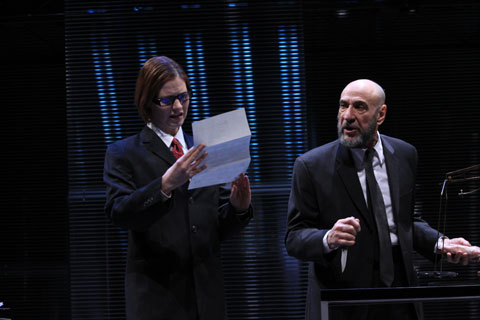
STRAINED MERCY Don’t look for a happy ending in this disquieting production of Shakespeare’s “problem comedy. |
The Rialto intersects Wall Street in Theatre for a New Audience's steely, droll, and deeply disquieting The Merchant of Venice (presented by ArtsEmerson at the Cutler Majestic Theatre through April 10). Oscar winner F. Murray Abraham is the dignified, humiliated heart of Darko Tresnjak's 21st-century staging, in which the lottery for Portia's hand is conducted by Apple laptop and almost everyone is on a cell phone. First mounted in New York in 2007, paired there with Christopher Marlowe's The Jew of Malta (the title role also essayed by Abraham), the production is set against a gleaming glass-and-metal high-rise where callow young brokers have one eye on the stock-market ticker and the other on the mostly monetary gossip around a town where everything's a transaction. No ameliorator, Tresnjak shies neither from the anti-Semitism in the play nor from the cruelty to which Shylock's pain and maltreatment push him. Neither does the director buy into the play's happy ending, here a melancholy dance that sets you wondering whether the quality-of-mercy song might not next be sung in a divorce court.
One of the problems with Shakespeare's so-called problem comedy is the way in which it bounces back and forth between mercenary Venice, where Shylock is beseeched, spat upon, and robbed of his daughter and his ducats, and romantic Belmont, where Portia must endure the posthumous control of her well-meaning dad via the ritual of the caskets. Although more Champagne is swilled at Belmont, the two worlds, linked in this rendering by Blackberry and Internet, don't seem so far apart. Neither is the play's cruelty confined to Venice, where Shylock, in the midst of his grief, is taunted in the street and kicked in the pants. Kate MacCluggage's brainier Paris Hilton of a Portia can be pretty snarky about her suitors, and in one thoughtless allusion to the Prince of Morocco (who arrives with an entourage and a scimitar suitable for photo ops), she proves herself a bit of a racist. And lest the ethnic stereotyping be confined to Jews and African potentates, the production provides a Launcelot Gobbo (wittily played by Jacob Ming-Trent) hooked on hip-hop and reefer.
But it's up in the air in Tresnjak's production, awash as it is in moral and sexual ambiguity, whether Abraham's heartfelt but implacable Shylock or Tom Nelis's arrogant Antonio (a cross between As You Like It's Jaques and Tim Gunn) is more sinned against than sinning. Asked by Bassanio to raise money for his pricy journey to Belmont to win an heiress wife, Antonio condescends to borrow money from Shylock and then assents to the Jew's "merry sport" of making the collateral a pound of his goyish flesh. But when not exhibiting an adamant physical tenderness toward Bassanio, he radiates a contempt that carries into the courtroom. There, when approached by Shylock with his knife, he spits in the Jew's face — whereupon Abraham's Shylock spits right back, having by this time moved beyond heartbreak and impassioned complaint to the cool zealotry that demands his "bond."